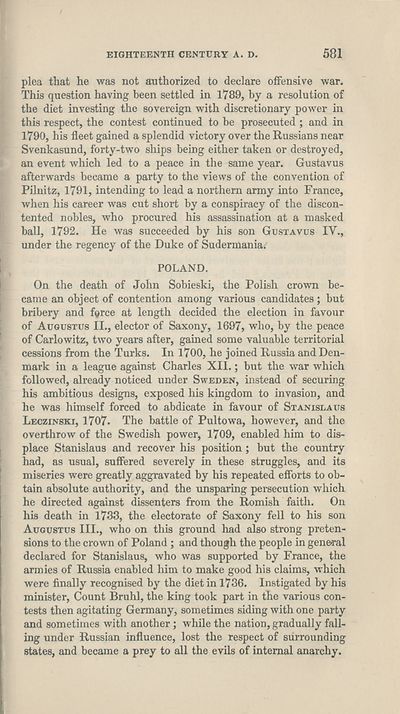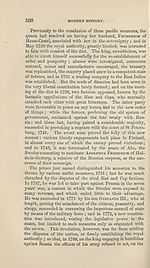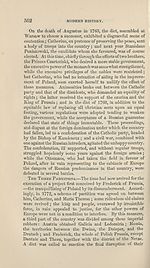Download files
Complete book:
Individual page:
Thumbnail gallery: Grid view | List view

EIGHTEENTH CENTURY A. D.
581
| plea that he was not authorized to declare offensive war.
| This question having been settled in 1789, by a resolution of
| the diet investing the sovereign with discretionary power in
I this respect, the contest continued to be prosecuted ; and in
I 1790, his fleet gained a splendid victory over the Russians near
i; Svenkasund, forty-two ships being either taken or destroyed,
I an event which led to a peace in the same year. Gustavus
| afterwards became a party to the views of the convention of
I Pilnitz, 1791, intending to lead a northern army into France,
|( when his career was cut short by a conspiracy of the discon-
I tented nobles, who procured his assassination at a masked
■ hall, 1792. He was succeeded by his son Gustavus IV.,
< under the regency of the Duke of Sudermania.
POLAND.
On the death of John Sobieski, the Polish crown be¬
came an object of contention among various candidates; hut
bribery and force at length decided the election in favour
i of Augustus II., elector of Saxony, 1697, who, by the peace
I of Carlowitz, two years after, gained some valuable territorial
j cessions from the Turks. In 1700, he joined Russia and Den¬
mark in a league against Charles XII.; but the war which
S followed, already noticed under Sweden, instead of securing
I his ambitious designs, exposed his kingdom to invasion, and
! he was himself forced to abdicate in favour of Stanislaus
I Leczinski, 1707. The battle of Pultowa, however, and the
l overthrow of the Swedish power, 1709, enabled him to dis¬
place Stanislaus and recover his position; but the country
had, as usual, suffered severely in these struggles, and its
miseries were greatly aggravated by his repeated efforts to ob¬
tain absolute authority, and the unsparing persecution which
he directed against dissenters from the Romish faith. On
his death in 1733, the electorate of Saxony fell to his son
Augustus III., who on this ground had also strong preten¬
sions to the crown of Poland ; and though the people in general
declared for Stanislaus, who was supported by France, the
armies of Russia enabled him to make good his claims, which
were finally recognised by the diet in 1736. Instigated by his
minister, Count Bruhl, the king took part in the various con¬
tests then agitating Germany, sometimes siding with one party
and sometimes with another; while the nation, gradually fall¬
ing under Russian influence, lost the respect of surrounding
states, and became a prey to all the evils of internal anarchy.
581
| plea that he was not authorized to declare offensive war.
| This question having been settled in 1789, by a resolution of
| the diet investing the sovereign with discretionary power in
I this respect, the contest continued to be prosecuted ; and in
I 1790, his fleet gained a splendid victory over the Russians near
i; Svenkasund, forty-two ships being either taken or destroyed,
I an event which led to a peace in the same year. Gustavus
| afterwards became a party to the views of the convention of
I Pilnitz, 1791, intending to lead a northern army into France,
|( when his career was cut short by a conspiracy of the discon-
I tented nobles, who procured his assassination at a masked
■ hall, 1792. He was succeeded by his son Gustavus IV.,
< under the regency of the Duke of Sudermania.
POLAND.
On the death of John Sobieski, the Polish crown be¬
came an object of contention among various candidates; hut
bribery and force at length decided the election in favour
i of Augustus II., elector of Saxony, 1697, who, by the peace
I of Carlowitz, two years after, gained some valuable territorial
j cessions from the Turks. In 1700, he joined Russia and Den¬
mark in a league against Charles XII.; but the war which
S followed, already noticed under Sweden, instead of securing
I his ambitious designs, exposed his kingdom to invasion, and
! he was himself forced to abdicate in favour of Stanislaus
I Leczinski, 1707. The battle of Pultowa, however, and the
l overthrow of the Swedish power, 1709, enabled him to dis¬
place Stanislaus and recover his position; but the country
had, as usual, suffered severely in these struggles, and its
miseries were greatly aggravated by his repeated efforts to ob¬
tain absolute authority, and the unsparing persecution which
he directed against dissenters from the Romish faith. On
his death in 1733, the electorate of Saxony fell to his son
Augustus III., who on this ground had also strong preten¬
sions to the crown of Poland ; and though the people in general
declared for Stanislaus, who was supported by France, the
armies of Russia enabled him to make good his claims, which
were finally recognised by the diet in 1736. Instigated by his
minister, Count Bruhl, the king took part in the various con¬
tests then agitating Germany, sometimes siding with one party
and sometimes with another; while the nation, gradually fall¬
ing under Russian influence, lost the respect of surrounding
states, and became a prey to all the evils of internal anarchy.
Set display mode to:
![]() Universal Viewer |
Universal Viewer | ![]() Mirador |
Large image | Transcription
Mirador |
Large image | Transcription
| Antiquarian books of Scotland > Education > Elements of universal history on a new and systematic plan > (601) |
|---|
| Permanent URL | https://digital.nls.uk/127587352 |
|---|
| Description | Thousands of printed books from the Antiquarian Books of Scotland collection which dates from 1641 to the 1980s. The collection consists of 14,800 books which were published in Scotland or have a Scottish connection, e.g. through the author, printer or owner. Subjects covered include sport, education, diseases, adventure, occupations, Jacobites, politics and religion. Among the 29 languages represented are English, Gaelic, Italian, French, Russian and Swedish. |
|---|

